Marrying Vega and Zen: The AMD Ryzen 5 2400G Review
by Ian Cutress on February 12, 2018 9:00 AM ESTBenchmarking Performance: CPU Encoding Tests
One of the interesting elements on modern processors is encoding performance. This includes encryption/decryption, as well as video transcoding from one video format to another. In the encrypt/decrypt scenario, this remains pertinent to on-the-fly encryption of sensitive data - a process by which more modern devices are leaning to for software security. Video transcoding as a tool to adjust the quality, file size and resolution of a video file has boomed in recent years, such as providing the optimum video for devices before consumption, or for game streamers who are wanting to upload the output from their video camera in real-time. As we move into live 3D video, this task will only get more strenuous, and it turns out that the performance of certain algorithms is a function of the input/output of the content.
All of our benchmark results can also be found in our benchmark engine, Bench.
7-Zip 9.2: link
One of the freeware compression tools that offers good scaling performance between processors is 7-Zip. It runs under an open-source licence, is fast, and easy to use tool for power users. We run the benchmark mode via the command line for four loops and take the output score.
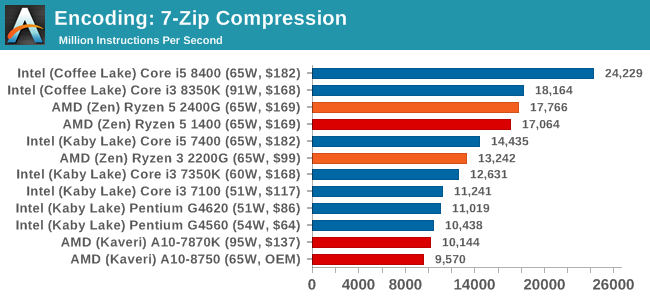
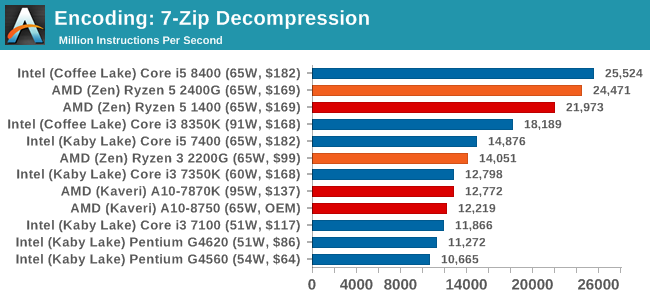
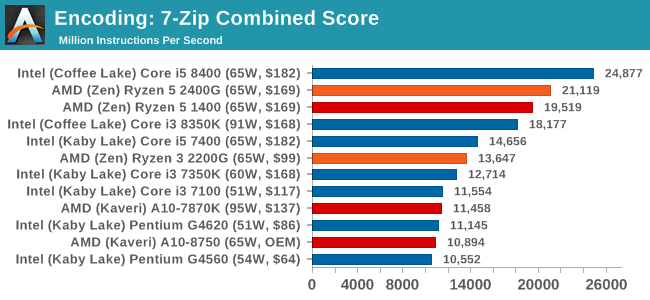
7-zip gives two contrasting stories here. For compression, full cores are needed to get the best performance, with frequency helping as well. However, for decompression, the extra threads help a lot. The combined result looks more like the decompression score, with the Ryzen 5 2400G sitting between the six-core Core i5-8400 and the quad-core Core i3-8350K.
WinRAR 5.40: link
For the 2017 test suite, we move to the latest version of WinRAR in our compression test. WinRAR in some quarters is more user friendly that 7-Zip, hence its inclusion. Rather than use a benchmark mode as we did with 7-Zip, here we take a set of files representative of a generic stack (33 video files in 1.37 GB, 2834 smaller website files in 370 folders in 150 MB) of compressible and incompressible formats. The results shown are the time taken to encode the file. Due to DRAM caching, we run the test 10 times and take the average of the last five runs when the benchmark is in a steady state.
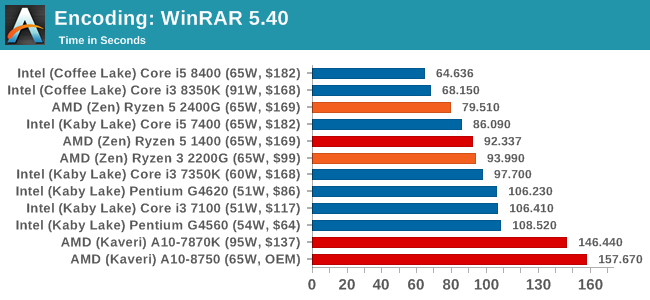
WinRAR is a good scaler with cores, frequency, and memory performance. The eight threads and DDR4-2933 contributes a good amount to the performance here, especially in light of where AMD was. The jump from the Ryzen 5 1400 to the 2400G is also noticable, due to the uptick in frequency and memory speed. The high single-thread performance of the Intel cores still wins out, however.
AES Encoding
Algorithms using AES coding have spread far and wide as a ubiquitous tool for encryption. Again, this is another CPU limited test, and modern CPUs have special AES pathways to accelerate their performance. We often see scaling in both frequency and cores with this benchmark. We use the latest version of TrueCrypt and run its benchmark mode over 1GB of in-DRAM data. Results shown are the GB/s average of encryption and decryption.
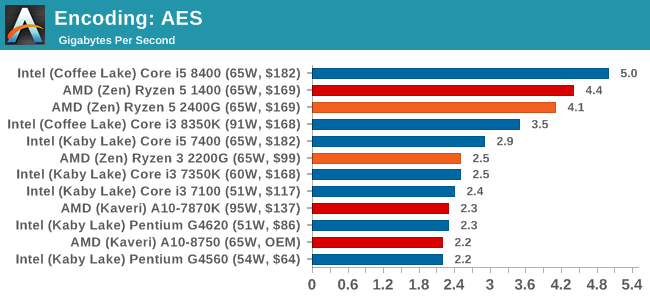
HandBrake v1.0.2 H264 and HEVC: link
As mentioned above, video transcoding (both encode and decode) is a hot topic in performance metrics as more and more content is being created. First consideration is the standard in which the video is encoded, which can be lossless or lossy, trade performance for file-size, trade quality for file-size, or all of the above can increase encoding rates to help accelerate decoding rates. Alongside Google's favorite codec, VP9, there are two others that are taking hold: H264, the older codec, is practically everywhere and is designed to be optimized for 1080p video, and HEVC (or H265) that is aimed to provide the same quality as H264 but at a lower file-size (or better quality for the same size). HEVC is important as 4K is streamed over the air, meaning less bits need to be transferred for the same quality content.
Handbrake is a favored tool for transcoding, and so our test regime takes care of three areas.
Low Quality/Resolution H264: Here we transcode a 640x266 H264 rip of a 2 hour film, and change the encoding from Main profile to High profile, using the very-fast preset.
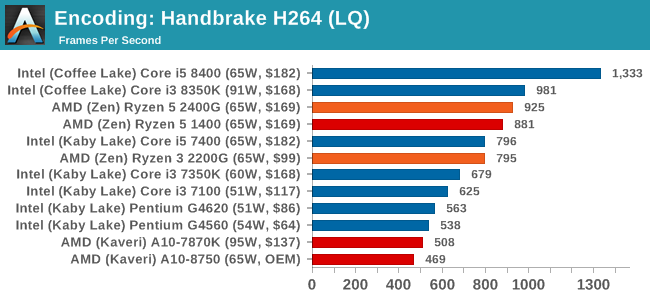
High Quality/Resolution H264: A similar test, but this time we take a ten-minute double 4K (3840x4320) file running at 60 Hz and transcode from Main to High, using the very-fast preset.
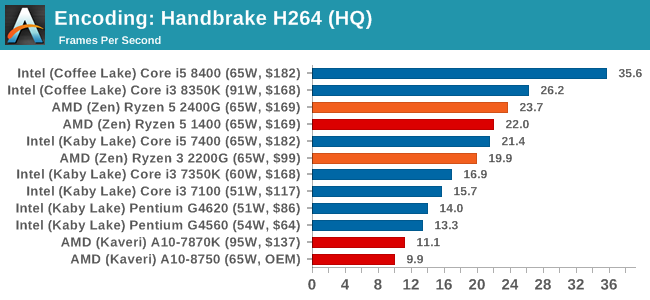
HEVC Test: Using the same video in HQ, we change the resolution and codec of the original video from 4K60 in H264 into 4K60 HEVC.
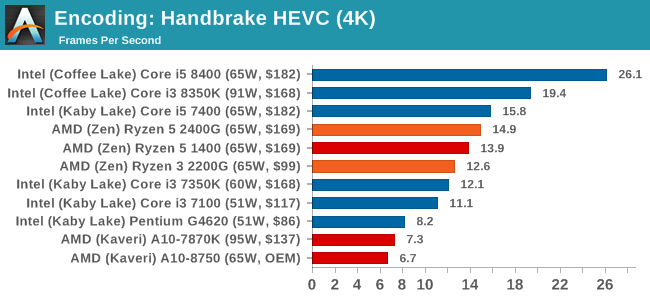










177 Comments
View All Comments
Gideon - Monday, February 12, 2018 - link
BTW Octane 2.0 is retired for Google (just check their github), and even they endorse using Mozillas Speedometer 2.0 (darn can't find the relevant blog post).Ian Cutress - Monday, February 12, 2018 - link
I know; in the same way we have legacy benchmarks up, some people like to look at the data.Not directed to you in general, but don't worry if 100% of the benchmarks aren't important to you: If there's 40 you care about, and we have 80 that include those 40, don't worry that the other 40 aren't relevant for what you want. I find it surprising how many people want 100% of the tests to be relevant to them, even if it means fewer tests. Optane was easy to script up and a minor addition, just like CB11.5 is. As time marches on, we add more.
kmmatney - Monday, February 12, 2018 - link
In this case, a few 720p gaming benchmarks would have been useful, or even 1080p at medium or low settings.III-V - Tuesday, February 13, 2018 - link
Who uses 720p and is in the market for this?PeachNCream - Tuesday, February 13, 2018 - link
I'm happy with 1366x768 and I'm seriously considering the 2400G because it looks like it can handle max detail settings at that resolution. I'm not interested in playing at high resolutions, but I do like having all the other non-AA eye candy turned on.atatassault - Tuesday, February 13, 2018 - link
People who buy sub $100 monitors.WorldWithoutMadness - Tuesday, February 13, 2018 - link
Just google GDP per capita and you'll find huge market for 720p budget gaming pc.Sarah Terra - Wednesday, February 14, 2018 - link
Wow, i just came here after not visiting in ages, really sad to see how far this site has fallen.Ian Cutress was the worst thing that ever happened to Anandtech.
At one point AT was the defacto standard for tech news on the web, but now it has simply become irrelevant.
Unless things change i see AT slowly but surely dying
lmcd - Friday, March 22, 2019 - link
Wow, I just came to this article after not visiting for ages, really sad to see how the comment section has fallenmikato - Thursday, February 15, 2018 - link
Me. My TV is 720p and still kicking after many years. These CPUs would make for a perfect high end HTPC with some solid gaming ability. Awesome.